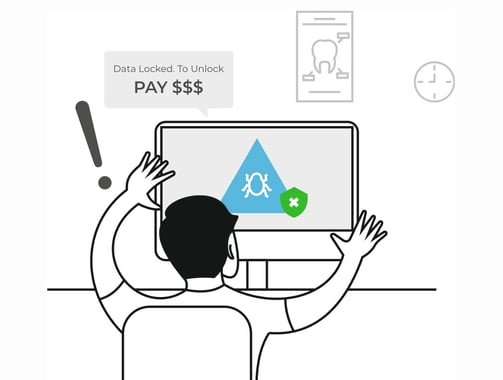
Data breaches are costly to dental practices. According to a study sponsored by IBM Security and conducted by Ponemon Institute, data breaches cost the healthcare industry $380 per compromised record. Recently, hundreds of dental practices that got compromised were asked to pay bitcoins. Are you safe?
When a data breach occurs, you’ll not only incur hefty HIPAA penalties but also have to pay for reporting the information to the media, notifying the U.S. Department of Health & Human Services (HHS), forensic investigation, and credit monitoring services for affected patients.
credit monitoring services for affected patients.
Not to mention, a data breach will damage your reputation and erode the trust your patients and community have in your practice. In fact, the Ponemon Institute estimated that lost revenue and brand value account for 40 percent of the total cost of a data breach.
Even more alarming, as much as 60 percent of small businesses have to close their doors within 6 months of suffering a cyber attack, so it’s imperative that you understand how to protect your dental practice from hackers.
Malware, short for malicious software, is designed to disrupt, damage, or gain unauthorized access to a computer network. It’s a blanket term referring to viruses, worms, trojans, and other harmful computer programs that hackers use, often to gain access to sensitive information.
There are many forms of malware, such as ransomware, spyware, adware, and cryptojacking. In particular, ransomware is widely used by criminals to attack the healthcare industry, including dental practices.
For example, a dental practice in Minnesota was targeted by a hacker twice in a week and Dr. Wallin had to pay over $70,000 to regain access to his patient database and get his files back.
Malware can be used by criminals to access sensitive patient data, which can be monetized in many ways -- resulting in identity theft and insurance fraud that could cost consumers extensive damages.
Some malware, such as DeFray, permanently encrypt a victim’s file. If the medical or dental practice doesn’t have a recent backup, important information regarding a patient’s health and treatments could be lost. Medical devices can also be hacked, leading to errors and delay in providing treatments.
There are many ways cyber criminals can target a practice's electronic systems and gain access to confidential medical records and sensitive patient information (e.g., social security number, date of birth, and other demographic information,). They can sell on the dark market or use to commit insurance fraud!
Here are some common points of vulnerabilities that hackers tend to target:
Most dental practices don’t have the extensive IT resources to keep up with the latest cyber security best practices and sufficiently protect their systems by staying ahead of cyber criminals.
It has become increasingly costly for most dental practices to stay HIPAA compliant by implementing the latest security measures on an on-premise network solution.
To minimize security issues associated with storing on-premises data, more dental practice are moving to cloud-based dental software as a solution to data security threats.
Moving to cloud eliminates the risk of ransomware hitting the data because protected patient data is not stored locally, hence, the risk of getting compromised is mitigated completely. In case of getting infected by ransomware, all you need do is unplug the network, re-format hard-disk and reinstall OS to start fresh - it is that simple!
In addition, here’s why cloud-based dental practice management platforms offer enhanced security and compliance:
Using cloud-based dental practice management software can help you mitigate many security risks associated with on-premise data storage. You can better protect your patients’ sensitive information and stay HIPAA compliant while lowering the cost associated with maintaining IT security.
These Stories on HIPAA
No Comments Yet
Let us know what you think